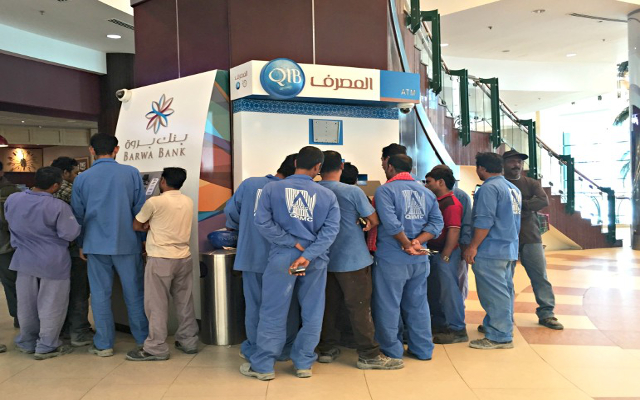For over four months, as many as 400 migrant workers in Qatar have not received payment for their work. Their employer ETA Star, an electrical and construction company, has ties to the United Arab Emirates (UAE), as it is overseen by an Abu Dhabi-based firm and. In addition to leaving hundreds of migrants unpaid, the situation has directly led to at least one death. On 7 September, Ajaya Behara, an Indian national, hanged himself weeks after asking his employer to pay his outstanding wages. The CEO of ETA Star commented on the case, saying Behara’s “wages were a month late,” which is “common in the industry.” This is common in the industry due to government passivity. Official inaction allows for companies, such as ETA Star, to take advantage of migrant workers.
The Qatari government, as well as the Emirati government, need to take responsibility for the company’s failure to pay its workers, as they did not ensure the proper safeguards were in place to prevent this from occurring. Government mechanisms contributed to the environment in which private companies are able to exploit their workers without fear of interference.
The majority of the affected workers are Indian, and they are set to meet with the Indian ambassador in Doha soon. However, a spokesperson from the Indian Community Benevolent Forum charity, Arvin Patil, has stated that there are migrants from other countries who have also gone unpaid by the same employer. Patil’s organization is unable to help all of the unpaid workers, although the charity would be able to handle a few individual cases. He stated, “We could give money if there were one or two people but 300 minimum is very, very difficult.”
The current situation in Qatar comes just months after Indian Prime Minister Narendra Modi met with Qatar’s Emir Tamim Bin Hamad Al-Thani in June to discuss labor reforms in Qatar that would benefit Indian workers there. There are about 630,000 Indian migrant workers in Qatar, and many work in low-paying positions, such as construction. Sheikh Al-Thani briefed PM Modi that recent reforms in labor laws would protect Indian workers. However, like the implementation of a wage protection system (WPS), these reforms have failed migrant workers.
The problem of companies withholding pay from their workers is a long-established issue in Qatar. In November 2015, the Government of Qatar openly admitted that this practice was widespread. It introduced a new WPS that forces employers to pay their workers electronically. Qatari officials hoped that the WPS would ensure employers paid their employees the correct wages at the correct time. The government was supposed to impose fines and barrier to operations on the companies found to be in violation of the law. However, this has not been the case.
The WPS remains difficult for small and medium-sized companies to implement, and only works when legal, registered workers hold bank accounts in Qatar. Only about 20 percent of migrant workers in Qatar have a bank account. Furthermore, illegal workers who are trafficked into the country are unable to sign up for the WPS. Therefore, the system Qatar touts as helping ensure workers’ rights is not fully functional, leading employers’ continued withholding of wages from their employees. The Government of Qatar needs to address the flaws in the WPS in order for it to properly protect migrant workers’ rights.
Wage non-payment issues are not unique to Qatar, and are symptomatic of larger Gulf Cooperation Council (GCC) apathy towards insufficient labor rights in the region. Over 10,000 Indian, Pakistani, and Filipino workers are currently unpaid and starving in Saudi Arabia due to government inaction. For example, employees of an Emirati cleaning company recently won a court case against their employers for withholding their salaries, however, they were still not paid for months. In late August, over 200 migrant workers went on strike against their employers in Kuwait after they had not been paid for over six months. The trend of withholding wages is seen throughout the GCC, and this culture of worker abuse needs to be abolished.
Wage protection systems cannot be the only safeguards put in place to ensure workers get paid on time. The Governments of the GCC need to create and enforce policies that ensure migrant workers are first legally in the country and registered. This will help to mitigate the issues of migrant workers being denied government assistance after being illegally trafficked into the country. Officials in the GCC also need to work more efficiently across borders in order to provide oversight to companies that are based in one GCC member and operating in another. Both such countries must held responsible for the company’s human and labor rights violations.
Wage withholding is ultimately a symptom of larger migration policy failures. Companies are not paying their workers because they do not have adequate incentives to do so. The six governments in the GCC need to work together in order to send a message to private companies that there will be consequences for them if they break international labor standards and abuse workers. These same countries also need to ensure that their public companies are also upholding these same standards.
Brittany Hamzy is an Advocacy Fellow at ADHRB.





